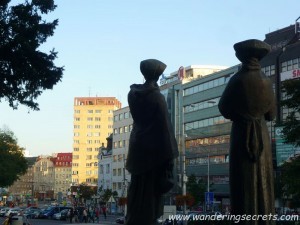
“The more languages you know, the more men you are.”
Being a teacher doesn’t mean that you have all the knowledge. Being a teacher includes learning from your students.
And last week, I learnt something. A simple sentence, an old proverb still used in Slovakia. A proverb that explains why Slovaks are open-minded, why it’s easier for them to learn languages, why they see it as an elevation of the mind more than a practical tool to get by in our modern world.
Koľko jazykov vieš, toľkokrát si človekom.
It even sounds beautiful. It tuns a painful colonial past into a strengh. It’s showing the world how much people can take on them and how they come out of it with glory.
And it’s clever. And true.
Anyone who can speak a foreign language notices that they act different in both languages. The voice changes, our laugh doesn’t sound the same, our attitudes, our humour. Knowing a language is also letting antoher culture in. Turning into someone else while being the same man. It’s being someone from the country you know the language of.
I thought people spoke English in Bratislava because it’s a capital city. But a lot-if not most- of them can also speak French, Russian, Hungarian or Polish.
It also turns out that outside Bratislava, when people can’t speak English, we can still communicate. Slovakia is the first country I’ve been to where people know how to express themselves without language. It’s an ability we have as children but that we loose when we grow up. But problably because of history, Slovaks kept and nurtrured that ability.
Which means that:
When asking you if you’d like normal or light cigarets, the lady shows you the percentage on the pack. (simple, eh?)
When taking an elevator in a private building, people demonstrate how you have to use your card to get in.
When buying wine, the lady shows you a red cloth and a white one.
When the landlady shows up with a handyman to fix something, it doesn’t take more than 10 minutes to mime the problem, the solution and the amount to pay.
It can seem simple, but in China people would literally run away if we couldn’t understand them. In hotels, receptionists would hide in the staff room if they couldn’t speak English without even trying to talk to us in Chinese.
In England, people wouldn’t slow down their speech.
There are millions of good reasons that explain why people reacted that way. But in none of them was there someone to stop for a second and start communicating with gestures, writing or demonstrating. Until Slovakia.
And I’m rambling about that proverb, but it’s also the first time I hear a proverb about languages being part of daily life.
And I think we could learn a lot from it but then, I’m a language teacher.








